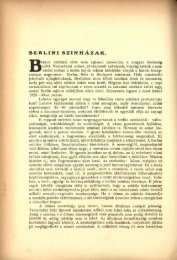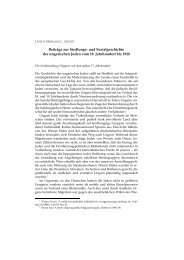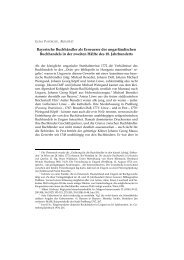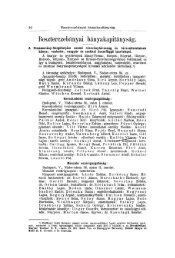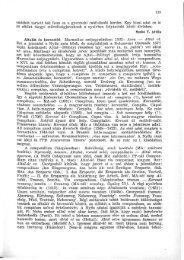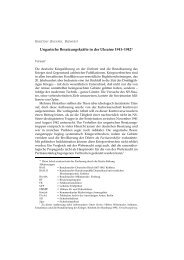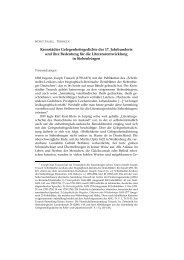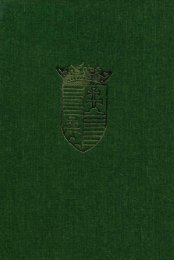hungarian studies - EPA - Országos Széchényi Könyvtár
hungarian studies - EPA - Országos Széchényi Könyvtár
hungarian studies - EPA - Országos Széchényi Könyvtár
Create successful ePaper yourself
Turn your PDF publications into a flip-book with our unique Google optimized e-Paper software.
THY SPEECH BEWRAYETH THEE<br />
existence of "nine chosen beings who can control their destiny, who are ruled<br />
neither by gods, nor by demons, nor by stars." Of course, Tier Nan Gorduin is one<br />
of the nine (Banners of Flame).<br />
This withdrawal from any ethical commitment seems related to the consequences<br />
of the recent socio-political changes in Hungary, or the general and deepening<br />
uncertainty regarding values. Nevertheless, the presence and increasing influence<br />
of mystical and occult topics, in both society and science fiction, should be perceived<br />
not just as a result of the loss of stable values but as part of the present<br />
cultural importation process as well.<br />
The palpably cynical ideology manifest in these novels - comparable to Glen<br />
Cook's The Black Company series - is partly concealed behind mystical or occult<br />
occurrences. In one episode Tier Nan Gorduin suddenly found himself among the<br />
legendary Kyr nobility about ten thousand years prior to his own era. "Shri-En<br />
Igron, Kyria utolsó uralkodója felemelte jobbját: kezdetét vette a tanácskozás.<br />
Gorduin, aki csak őt figyelte, idővel rátalálni vélt a lázadás valódi okára: a gyarló<br />
ember számára nincs bőszítőbb a nap alatt az ilyen szembeötlő tökéletességnél."<br />
[Shri-En Igron, the last ruler of Kyria, held up his right hand and the council<br />
commenced. Gorduin, who watched only him, thought after a while that he had<br />
hit upon the real cause of the rebellion: for fallible humans there is nothing more<br />
exasperating under the sun than such striking perfection, p. 265]. Yet, some familiar<br />
stereotypes are also used. The people in power, the gods, the magi, the priests,<br />
and the politicians are never truly reliable; and the women are generally beautiful,<br />
treacherous and lustful. Salina in Banners of Flame, although very pretty, is different.<br />
But her character is just the exception that proves the rule. There are certain<br />
clichés in how men have depicted women, or acknowledged female roles in<br />
the course of time; and both of the female characters in Blood Season belong to<br />
the type that can only be described as succuba, or a demonic version of the femme<br />
fatale, the deadly seductress. None of them is wholly human. The other type, for<br />
instance in Two Moons, is the victim. This may be an individual trait, or perhaps<br />
springs from the rather conservative worldview that is so characteristic of Hungarian<br />
fantasy fiction. Nevertheless, it certainly deserves further investigation.<br />
When I first started analysing these novels, their use of language and style did<br />
indeed make me wonder whether they could possibly be translations. The writing<br />
was excellent, inventive, yet not excessively so. Its touch of heroism and humour<br />
was very characteristic, and therefore easily recognisable. These characteristics<br />
made the reading easily intelligible and undemanding. These books do not require<br />
any effort from the reader; and particularly the second versions tend to include<br />
fashionable mystical strands. Since one of the 'translators' was an excellent<br />
SF writer, the translational status did not seem to be impossible. The many misspellings<br />
only serve to heighten the perception that these are after all translated<br />
works; and one geographical name was rendered differently in the two editions of<br />
75


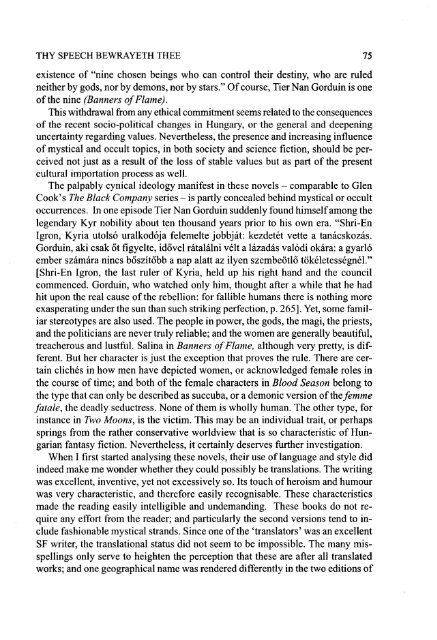
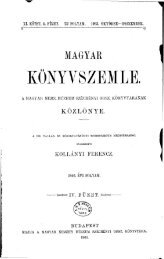
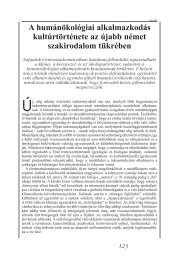
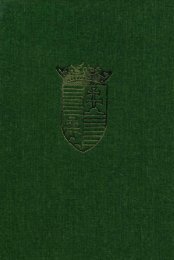
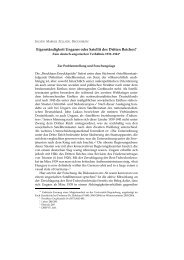
![Letöltés egy fájlban [36.8 MB - PDF] - EPA](https://img.yumpu.com/23369116/1/172x260/letoltes-egy-fajlban-368-mb-pdf-epa.jpg?quality=85)
